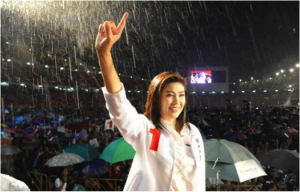Memo #97
(See below for a comment from Bangkok, by Canadian journalist Nelson Rand)
By Aim Sinpeng – thaiaim [at] gmail.com
 The highest voter turnout in history shows Thai voters still view elections as the most legitimate way to transfer power. 75 per cent of eligible voters participated in last week’s election. Pheu Thai took 40 per cent of the vote, gained 265 out of 500 seats, and together with five other parties will form a 300-seat coalition government – an impressive result for a party whose predecessors were ousted by a coup d’état in 2006, twice dissolved, and had their politicians banned from politics for five years.
The highest voter turnout in history shows Thai voters still view elections as the most legitimate way to transfer power. 75 per cent of eligible voters participated in last week’s election. Pheu Thai took 40 per cent of the vote, gained 265 out of 500 seats, and together with five other parties will form a 300-seat coalition government – an impressive result for a party whose predecessors were ousted by a coup d’état in 2006, twice dissolved, and had their politicians banned from politics for five years.
But the coming to power of Pheu Thai and Yingluck Shinawatra as Thailand’s first female prime minister is almost certain to prolong the political crisis that has deeply divided the country since 2005. A red-shirt aligned Pheu Thai government led by the sister of Thailand’s most popular yet polarizing figure, Thaksin Shinawatra, has Thailand walking on eggshells.
Even though the majority of Thais have demonstrated their commitment to democracy through their ballots, a small minority of conservative forces as well as some anti-Thaksinites have brought down popularly elected governments in the past. Forces opposing Pheu Thai have already begun trying to annul the election and dissolve the new governing party.
The military junta that ruled from 2006 to 2007 paved the way for future coups through an amnesty clause in the 2007 constitution. Given today’s popular sentiment in support of the new government, a coup is unlikely. What is likely is that the military will seek to delegitimize the Yingluck administration through moral suasion and demonization of the red-shirts as a threat to the monarchy and national security.
Any move to bring Thaksin back from exile in Dubai will create a major uproar among anti-Thaksin forces. Likewise, any attempt to dislodge the Pheu Thai government through dissolution, disqualification of the prime minister elect, or another coup, will push the nation to the brink of civil war.
National reconciliation can only begin once all power brokers accept the electoral outcome and allow Pheu Thai to form a government. It behoves the international community to signal support for the new government and oppose any effort to remove it before the next election.
About the Author:
Aim Sinpeng – a PhD student in the Department of Political Science at The University of British Columbia and Associate of the Centre for Southeast Asian Research.
A comment from Bangkok, by Canadian journalist Nelson Rand:
“With the Thai people having given a clear mandate to Pheu Thai, a window of opportunity has opened for national reconciliation. But all sides must compromise. Pheu Thai must be allowed to govern. Any decision by the courts or the military to negate Pheu Thai’s victory would result in a massive counter response that would likely feature violent unrest on an unprecedented scale. For its part, Pheu Thai must keep its distance from Thaksin, refrain from any immediate pardon for him and leave the top military leadership in tact. Only through mutual compromise and respect can the process of national reconciliation begin. While this process is ultimately up to the Thai people, the international community should give Thailand its moral and political support, but be quick to condemn any acts of provocation by any side.”
Links (all in Thai):
- Election Commission of Thailand (ECT). Official election results
- Article 309, 2007 constitution
Related Memos:
- Our collection of Memos on the Thailand 2011 Election and 2010 Conflict
- Thai-Cambodian Border Clashes – What is Fuelling them? by Nelson Rand (Memo #80)
- Our other Memos about Thailand and Southeast Asia
